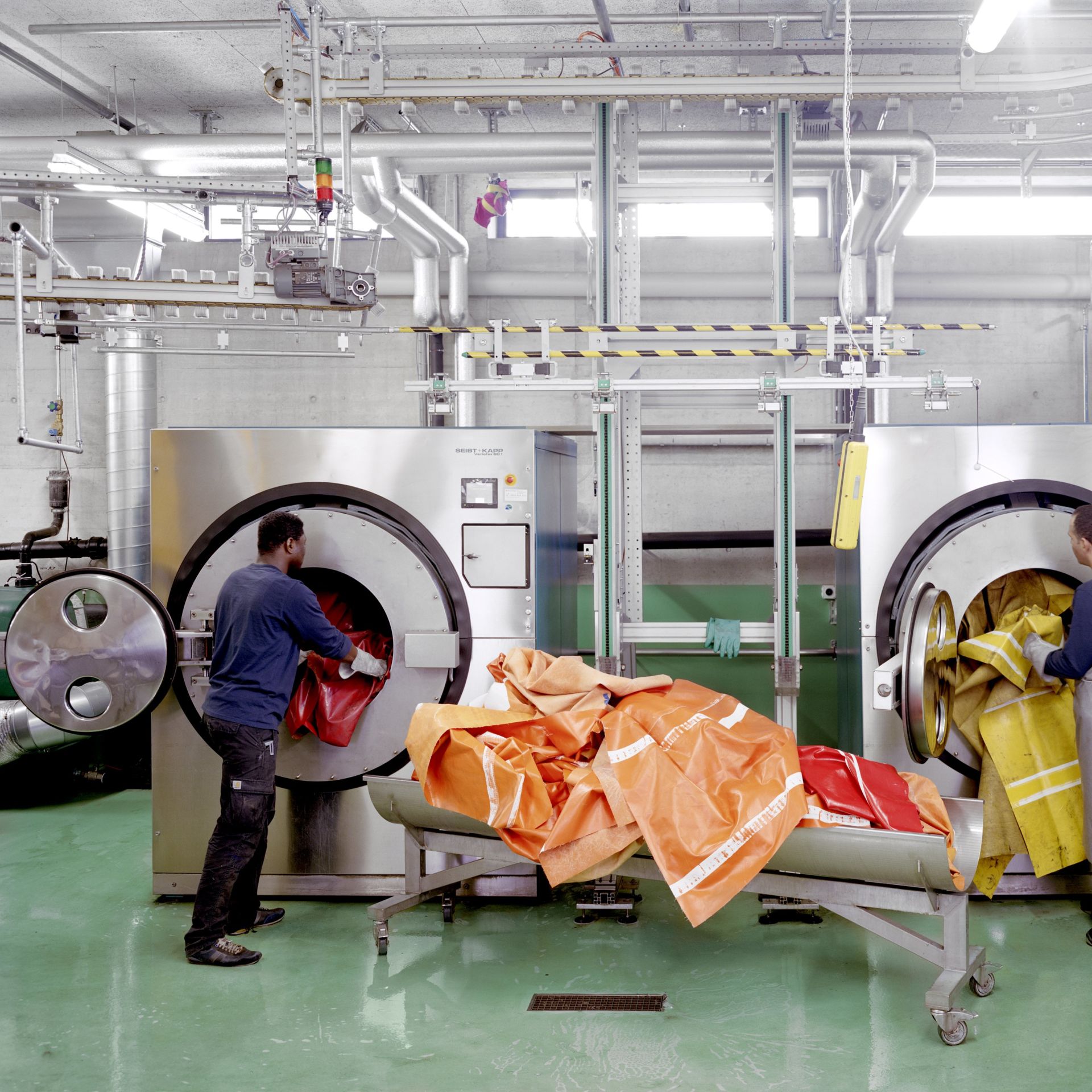PRODUCTION
HIGH-RES PHOTO DOWNLOAD
CREDITS
Please mention the Photo Credit: Joël Tettamanti






FROM TRUCK TILL BAG
To produce our bags and accessories, we need piles of recycled truck tarps, which we transform into unique pieces in five separate steps.
Every year, our tarp buyers (aka Truckspotter) buy around 340 tons of used truck tarps. We source over 85% of these through our agents. They buy used tarps for us within a radius of 2500 km and send us samples in advance so we can have the materials tested for safety.
Tarps suitable for bag production are taken apart by the agents and then delivered to us in Zurich-Oerlikon. Another 9% of the tarps we purchase come from direct suppliers in Germany, whose tarps are dismantled by a local partner. The rest comes from direct suppliers (e.g. freight companies) in Switzerland, Austria, Italy and France. We test the tarps and then take them apart ourselves in our Zurich production facility.
Following this step, the tarp sections are washed. At the next stage, the tarps are cut up in the Bag Design section to create unique pieces, partly by hand with a cutter knife and template and partly with the help of a machine, before being shipped to our European producers. There, the individual cut tarp pieces are sewn together with the other materials to form finished products, with producers in Bulgaria, Portugal and Switzerland also handling parts of the upstream cutting.
We purchase the necessary accessories and fabrics, such as recycled PET textiles or B-stock airbags, from selected suppliers. The finished items are then checked and photographed. This process is carried out partly by the producers but mainly takes place at our Nœrd headquarters. After that, they are ready for sale.
THE FIVE STEPS
1. RAW MATERIALS
Sourcing truck tarp, our most important raw material, is hard work. The recycled truck tarps used for our products are not available off the shelf but have to be actively hunted down by our Truckspotter. Once they arrive at the factory, the tarps are tested for their constituents to ensure that the safety of FREITAG products can be guaranteed.
2. CUTTING THE TARPS
In order to turn grimy garbage from the roads into the right raw material for a desirable bag, fearless tarp butchers are needed at the outset. With cutters, pliers and raw force, they free the bulky tarp beasts from their cords and fittings and then slice prime cuts from them. It’s tough work!
3. WASHING
What happens in our basement is almost identical to any other laundry room. Our three gigantic washing machines strip all the grime from the roads off the tarp pieces, revealing their unique patina. Because we use over one million gallons of water a year for our laundry activities, we collect rainwater from the roof of the factory and warm it up using the residual heat from the leftover dirty water. The clean tarps then make their way to the drying room instead of a power-hungry dryer.
4. BAG DESIGN
FREITAG has a whole bunch of different designers. Like other companies we hand the creation of new models to the actual design department. But at our factory, the job of cutting up tarps is part of the design process, too. Each bag pattern consists of several templates. Our bag designers lay these out on the tarps in such a way that as many bags as possible, each as beautiful as the next, can be cut from the raw material. This is what makes every FREITAG bag unique.
5. SEWING
Now it’s time for the cut tarp sections to leave the factory. They go to our longstanding partners in Portugal, Czechia, Bulgaria, Romania and Switzerland, where sewing machines rattle away stitching the individual pieces into robust products designed for tough, everyday use. When the finished bags return to the factory, they undergo a series of exacting quality-control tests before being dispatched to stores worldwide or being photographed as unique, individual items for presentation in the Online Store.
LESS TEXT - MORE STEPS
Our unique bag and accessory manufacturing process breaks down into five main stages with many separate steps. From its time on a truck cruising the roads to the actual sale, a unique FREITAG piece goes through numerous stages in and around our factory:
- Truck spotting
- Tarp removal
- Extract test sample
- Testing constituents
- Confirming that tarp is safe
- Disassembly
- Washing
- Drying
- Bag design
- Shipping to sewing partners
- Sewing
- Quality control
- Photography
- Shipping
- Sale
Using recycled materials and short transport routes in our supply chain keeps our carbon footprint comparatively low. In 2022, it amounted to 3402 metric tons of CO2 equivalent, or about 480 flights around the world. Along our entire value chain, we are actively working to further reduce our direct and indirect greenhouse gas emissions. If you want to know more about other measures we’ve introduced over the past year and our future plans, you can find out all about them in the first FREITAG Impact Report.
HIGH-RES PHOTO DOWNLOAD 1. RAW MATERIALS
CREDITS
Please mention the photo credits (see image caption).






HIGH-RES PHOTO DOWNLOAD STEP 2. CUTTING THE TARPS
CREDITS
Please mention the photo credits (see image caption).






HIGH-RES PHOTO DOWNLOAD STEP 3. WASHING
CREDITS
Please mention the photo credits (see image caption).






HIGH-RES PHOTO DOWNLOAD STEP 4. BAG DESIGN
CREDITS
Please mention the photo credits (see image caption).






HIGH-RES PHOTO DOWNLOAD STEP 5. SEWING
CREDITS
Please mention the photo credits (see image caption).












